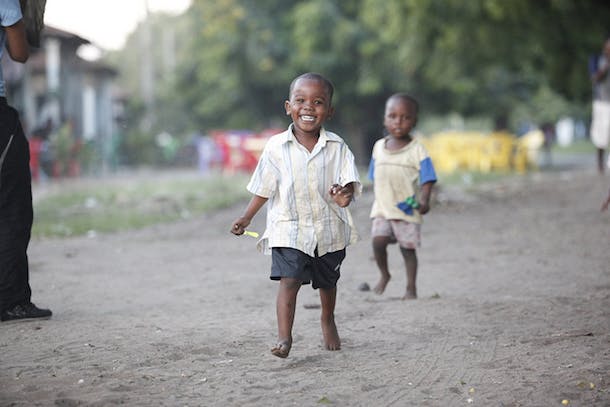
We recently had the opportunity to speak with Dr. Namala Mkopi, a child health specialist and pediatrician in Tanzania who was in Washington, D.C. to serve as a Global Immunization Fellow for the United Nations Foundation’s Shot@Life campaign.
Shot@Life works with the UN, partners, and individuals across the country to help protect children worldwide by providing life-saving vaccines where they are needed most.
Dr. Mkopi was visiting the United States to raise awareness of the importance of vaccines to protect children from pneumonia, which is the leading infectious cause of death in children worldwide, accounting for 16% of all deaths of children under 5 years old.
Here are highlights from our interview.
On why he got involved in advocating for expanded access to vaccines:
I am a pediatrician, and my main work is helping kids. What motivates me is particularly the situation back home in Tanzania.
The major killers are still the same – pneumonia, diarrhea diseases, especially vaccine-preventable diseases like measles, and the like.
We already have evidence in place back home [on vaccines]. We have been able to control polio; the last case of polio was reported in 1996. And the last case of neonatal tetanus was in 2006, and this is because of vaccines that mothers are getting either before pregnancy or during pregnancy. This really gives us the picture that this is actually one of the vaccinations that works pretty well. And it is very effective, cheap, and readily available.
I felt that if I can promote this initiative, if I can speak out, if I can do advocacy and make sure that everybody is educated, maybe we can get somewhere.
On Gavi, the Vaccine Alliance:
Gavi is one of the respectable organizations that is doing a lot in our countries.
Gavi is giving vaccines to the poorest countries, not for free, but for a very reduced price. Gavi has been very useful in providing these vaccines; they are making it easy for the country to access these vaccines. They are making the markets become easy so that the price can go down and the country can afford [the vaccines].
These countries have committed themselves, and they are paying a certain amount to Gavi, but to raise enough funds for Gavi to supply these vaccines, that’s where other countries and other philanthropies need to get involved.
It’s not the issue of somebody who has a lot of money – anybody can be part of this initiative, anybody can contribute, and anybody can be part of the change in saving the lives of these children.
On the impact of pneumonia and the power of vaccines to help children:
In my country, pneumonia is one of the biggest problems; it’s one of the biggest killers in the country of children less than 5 years.
There are a number of vaccines that help in different aspects of pneumonia.
The pertussis vaccine also helps in reducing the incidence of pneumonia. There is a measles vaccine. Most of the kids when they get measles, they can get pneumonia at the same time, and they can get malnutrition at the same time – preventing measles also helps in a way to prevent pneumonia. There is Haemophilus influenzae type b [vaccine], which we usually give against that particular bug which also causes pneumonia and meningitis. That is another one which is intervening in the cases of pneumonia.
These vaccines that I have mentioned have been there for some time. The vaccine that we now have is the pneumococcal vaccine. Among all of these bugs that are causing pneumonia, pneumococcal pneumonia is the worst. It’s the bug that is very aggressive and kills so fast and so easy – and they have so many types of subtypes in the group. The vaccine, which is available, is addressed to 13 strains of those subtypes. There are like 100 subtypes, but the vaccine which is available is addressing 13 – but these 13 are the most aggressive. And there is what we call cross-immunization – that you are targeting 13, but there are others which can also be prevented because they have a close relationship with these 13 that are targeted, so it’s a lot of protection.
We believe that we are going to reduce the incidence of the severe forms pneumonia.
On what we need to get the pneumococcal vaccine to more children:
Political will; government commitment.
If governments are committed, if there’s political will, and if the community’s educated enough, I think we will see a bigger impact of these vaccines.
On his message to individuals:
Many kids are dying from vaccine-preventable diseases. We should have vaccination equally distributed.
Nobody chooses to be where they are, nobody chooses to be born into a poor family, but they are born in these families. So if we – all people in this world – feel like everybody deserves to live, and tries to offer them protection, I feel like we will be achieving a very noble cause.
We are living in a global village. No matter where you are situated, things happening in another country or another continent can affect you. So let us all get involved in saving the most impoverished child in the world. Let’s work together so that we can have sustainable development everywhere in the world
TAKE ACTION: Visit ShotAtLife.org to learn more and get involved.
Photo credit: Stuart Ramson for UN Foundation



 View All Blog Posts
View All Blog Posts